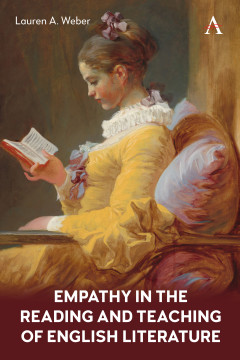Empathy in the Reading and Teaching of English Literature
By Lauren A. Weber
Other Formats Available:
E-Book- About This Book
- Reviews
- Author Information
- Series
- Table of Contents
- Links
- Podcasts
About This Book
Empathy in the Reading and Teaching of Literature explores the educational potential of empathy for literary studies across a historical, generic and geographic continuum. The book draws on interdisciplinary methodologies to offer new readings of popularly taught literary texts and discuss their relation to empathy. As a result, the book resists neoliberalism’s commodification of empathy and makes recommendations for the future of the teaching of literature at school and university.
The book begins by providing a theoretical and historical overview of empathy as a term and educational tool in the English speaking context. The first two chapters lay the groundwork for the remaining close reading chapters by introducing two new terms: ‘pop empathy’ and ‘empathic education’. I argue that pop empathy is defined by neoliberalism and the commodification of empathy in marketing, advertising, politics and artificial intelligence and that this is impacting the rhetoric of contemporary educational policy in Australia and the United States. Empathic education is defined by educational theory and practice where the experience of empathy is foregrounded as a form of knowledge creation or acquisition. I draw pop empathy and empathic education into conversation throughout the book and use both terms to assist my argument that a complex approach to empathy for literary studies may benefit classroom teaching and learning by resisting over-systematised education.
The remaining chapters of the book offer four unique approaches to empathic literary criticism informed by interdisciplinary methodologies, including educational theory, cognitive science, the philosophy of psychology and literary studies. Chapters 3, 4, 5 and 6 provide readings of texts frequently prescribed for English literary study belonging to different genres: Shakespeare's Hamlet, the poetry of John Keats, the short stories ‘A Good Man Is Hard to Find’ and ‘Everything That Rises Must Converge’ by Flannery O’Connor, and Mark Haddon's novel The Curious Incident of the Dog in the Night-Time. Each chapter engages with the text’s historical educational context and its contemporary relation to empathy while offering fresh close readings by applying a critical empathy lens. As a result, these chapters complicate and contribute to debates about the empathic value of subject English. I show how the authors and texts studied bear the mark of empathic education and as a result they offer unique impressions of empathy's make-up and capabilities. Through my readings, I show how empathy has consistently featured in literary studies across time periods and genres while complicating popular rhetorical uses of empathy. I address this wide scope of historical and generic texts as they relate to the current educational landscape because I argue for a new approach to integrating empathy into subject English that privileges empathy as a form of critical interpretation rather than a student outcome.
Reviews
Author Information
Series
Table of Contents
Links
Stay Updated
Information
Latest Tweets



